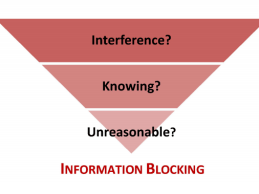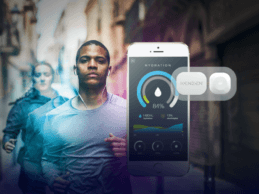If you’re a small healthcare IT operation, a simple spreadsheet might do the trick. If you’re larger, a not-so-simple spreadsheet might be in order.Regardless of how you do it, hospitals, clinics and other healthcare organizations must identify and monitor every single instance of computer network access. They’re called endpoints, says Larry Ponemon, founder of the security consulting firm the Ponemon Institute, and for you they exist as vulnerabilities.Your job is to eliminate them through a
Read More
Health IT & Digital Health-Opinion | Op-Eds | Guest Columns | Analysis, Insights - HIT Consultant
Why Data Block Is the Leading Cause of Death for Digital Health Startups
Editor's Note: Buff Colchagoff is the CEO of RosettaHealth, a cloud-based health messaging and exchange platform. Colchagoff has over 16 years of Health IT experience with large projects, including building the VA’s PHR MyHealtheVet, as operations manager for the Nationwide Health Information Exchange (NwHIN) which grew into the Sequoia Project, the Direct Project. Follow him on Twitter at @BuffColchagoffYou’re the leader of a digital health startup born in 2015, ready, willing, and eager to
Read More
EHR Optimization: Necessary Because EHRs Are Never “Done”
Regardless of how well or poorly your EHR was installed, EHR optimization ensures that your healthcare organization's EHR is changing with it.Why, if over 95 percent of hospitals have implemented EHRs, are so many planning to invest in improvements or replacements this year? A new Healthcare IT News survey of hospital executives showed that 24 percent are conducting a major EHR system upgrade, and 21 percent are replacing their EHR at one or more sites. KPMG’s survey of CHIME members last month
Read More
5 Ways Effective Healthcare IT Can Reduce Hospital Costs
The focus of federal efforts to incentivize healthcare IT adoption has primarily been on electronic health records (EHRs), which are oriented around hospitals and physician offices. Moving forward, EHRs will remain the anchor technology as data from other devices and applications flows in and becomes both available and comparable.It’s become readily apparent that healthcare IT is much broader than EHRs alone. Increasingly, healthcare IT is a web of interconnected devices and applications that
Read More
Sweat Is The New Blood: Why Sweat Analysis Is The Next-Gen of Wearable Diagnostics
Editor's Note: Dr. Sonia Sousa is CEO and Co-Founder of Kenzen, a startup that creates next-gen wearable diagnostics based on sweat analysis. Dr. Sousa founded several companies and has over 15 issued and pending patents in the US and worldwide (in photonics, predictive models, lasers, spectroscopy and more). With a PhD in Photonics and Neural Networks, Dr. Sousa is committed to advancing precision medicine and preventing health issues through wearable diagnostics that are clinically relevant,
Read More
Could Blockchain Technology Be the Answer to Health IT Interoperability?
Editor’s Note: D’Arcy Guerin Gue is a co-founder of Phoenix, with over 25 years of experience in executive leadership, strategic planning, IT services, knowledge leadership and industry relations — with a special focus on patient engagement and federal compliance issues. She currently serves as the VP of Industry Relations at Phoenix Health Systems, a division of Medsphere Systems.It’s no exaggeration to say that our EHR systems’ lack of interoperability is the single strongest barrier to
Read More
5 Tips To Prepare Any Patient For Their First Virtual Clinic Visit
Editor's Note:Dr. Robert Bernstein is the VP of Clinical Affairs, Carena, Inc., a healthcare technology company that designs and operates virtual clinics for health systems. More and more hospitals and health systems are leveraging integrated, on-demand virtual care in order to improve healthcare and address patient demand for low-cost convenient care. But many consumers remain unclear about how to use virtual care, and what they can expect during their first encounter.Dialing or logging into a
Read More
4 Improvements Data Analytics Will Bring to the Senior Care Space in 2017 & Beyond
Editor's Note: Al Baker is the co-founder and CEO of Reemo, a health technology platform designed to empower caregivers with actionable insights to improve the quality of life for seniors. Also features insights from Teradata Vice President, Strategic Ventures Peter Obringer and Vice President of Technology for New Business Development Jose Basa. We exist in a world where data is impacting nearly every aspect of our daily lives. From New York utilizing open data to critically analyze its street
Read More
Healthcare’s Password Prognosis
Editor’s Note: Dean Wiech is the Managing Director of Tools4ever, a global provider of access management and governance solutions. Dean has worked with healthcare organizations, educational institutions, municipalities for more than 20 years, helping them identify solutions that make their businesses and operations more secure, efficient and easier to manage. Passwords are everywhere. The headlines might tell us otherwise, but their death, and the exaggeration of such, means that they are and
Read More
The Importance of Risk Stratification in Population Health Management
Editor’s Note: Abhinav Shashank is the CEO & Co-founder at Innovaccer Inc., a datashop integrating complex data across multiple distributed sources to give healthcare organizations greater insights to provider better care.As value-based care becomes the primary focus of healthcare organizations, providers now need to broach population health management and to manage it with risk stratification with a delicate balance. It is now important for providers to focus on patients’ individual and
Read More










